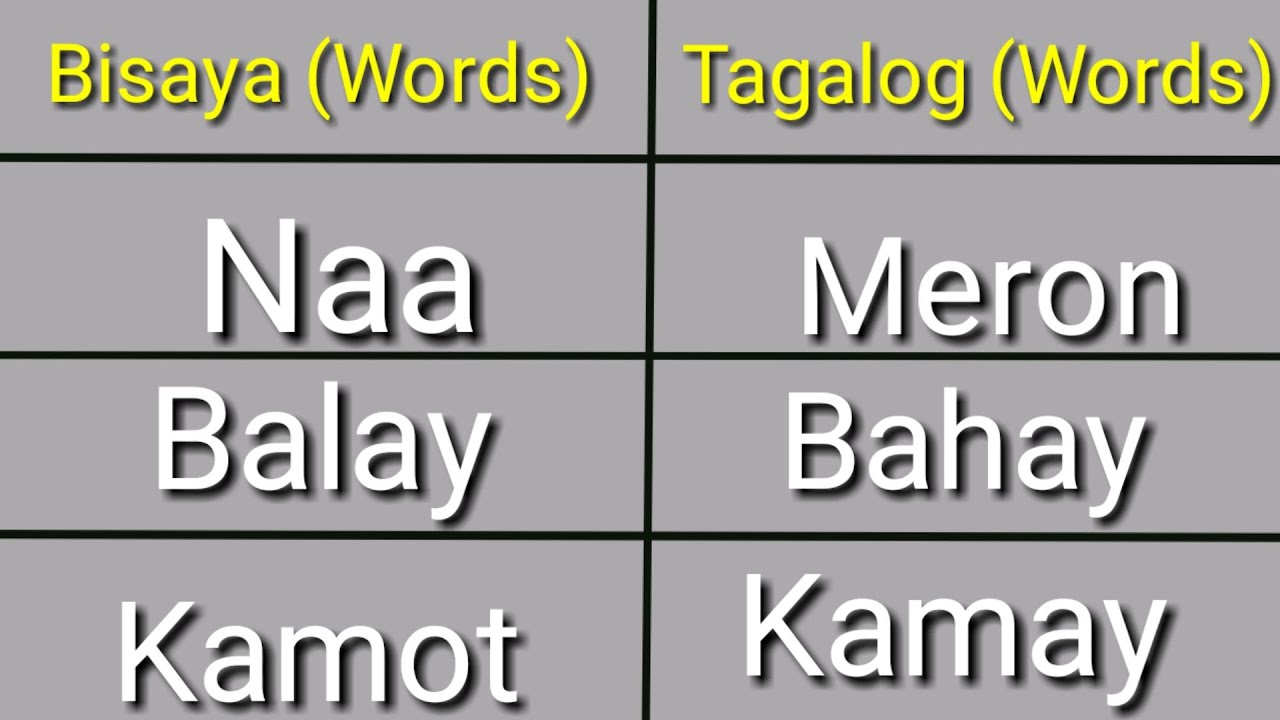There are many Bisaya to Tagalog words that would be helpful to learn for Tagalog and non-Bisaya speakers. Read more to find out.
There are at least 120 distinct languages in the Philippines. Filipino is our national language, with Tagalog as its basis or founding dialect.
Bisaya is a language spoken in Central and Eastern Visayas and some parts in Mindanao. It comes from the word Visayas, a major cluster of islands in the country along with Luzon and Mindanao. Bisaya is the language that represents all the dialects spoken in the aforementioned areas; however, it is used interchangeably with Cebuano, the dialect spoken in Cebu island.
Technically it is erroneous to ignore this distinction, but the difference between Cebuano and all other Bisayan dialects are almost indistinguishable to outsiders and it is not that big of an issue to most Bisayan speakers.
In this article, we will refer to the Cebuano dialect as Bisaya.
Why you should learn Bisaya
Bisaya is next to Tagalog in terms of how widely spoken it is, with over 20 million speakers all over the nation. And Cebu is second to Manila when it comes to economic and tourism prominence.
When you come to Cebu, learning a few useful (and some entertaining) phrases will go a long way.
Common Bisaya to Tagalog words
Hubad
In Tagalog: naked
In Bisaya: to decipher
Sample sentence: “Gi)hubad sa mananagna ang iyang pa’d.” / “Binasa ng manghuhula ang kanyang palad.” / “The fortune teller read their palm.”
Pagod
In Tagalog: to be tired
In Bisaya: to be burnt
Sample sentence: “(Na)pagod man ang kan-on.”/ ”Nasunog ang kanin.” / ”The rice is burnt.”
Libog
In Tagalog: pervert, libido
In Bisaya: confusing, confused
Sample sentence: “Libog man kaayo ka oy.”/ ”Nakakalito ka talaga.” / ”You’re so confusing.”
Langgam
In Tagalog: ant
In Bisaya: bird
Sample sentence: “Nitugpa ang langgam sa akong abaga.” / ”Dumapo ang langgam sa aking balikat.” / “The bird landed on my shoulder.”
Hubog
In Tagalog: shape, form
In Bisaya: drunk, inebriated
Sample sentence: “(Na)hubog jud ko kagabie.” / “Nalasing ako kagabe.” / “I got drunk last night.”
Lahi
In Tagalog: family, genetic trait
In Bisaya: different
Sample sentence: “Lahi ang iyang istilo.” / “Iba ang istilo niya.” / “They have a different style.”
Bati
In Tagalog: to great or call a truce
In Bisaya: ugly, undesirable
Sample sentence: “Bati siyag batasan.” / “Panget ang ugali nya.” / “Their attitude leaves much to be desired.”
Paa
In Tagalog: foot
In Bisaya: Leg
Sample sentence: “Hamis kaayo siyag paa.” / “Talagang makinis ang binti nya.” / “Their legs are really smooth.”
Kumot
In Tagalog: blanket
In Bisaya: to seize and crumple by hand, crush
Sample sentence: “(Gi)kumot sa maestra ang akong test paper.” / “The teacher crumpled my test paper.”
Palit
In Tagalog: to barter or exchange
In Bisaya: to buy
Sample sentence: “Palit diri nako Ma’am.” / “Bili ka sakin Ma’am.” / “Buy from me Ma’am.”
What Bisaya terms Tagalogs should know when coming to Cebu
Greetings
Good morning! – Maayong (can be shortened to Mayng) buntag!
Good afternoon! – Maayong hapon!
Good evening! – Maayong gabi-i!
Goodbye. – no Bisaya equivalent, but you can say Ayo-ayo! which means �?Take care’
Hello/Hi – Hello/Hi or Uy!
Expressions
See you soon/See you later – Kita ta puhon (or sa sunod) / Kitakits
How are you? – Kumusta ka?/ Musta?
I am fine, thank you. – Maayo man, salamat.
Thank you! – Salamat!
Take care! – Pag amping!/ Amping!
Don’t be like that. – Ayaw ana.
You are welcome! – Walay sapayan!/ Way igsapayan! / Way problema!
I am sorry – Pasaylo-a ko. / Pasensya na.
I understand. – Kasabot ko.
I don’t understand. – Wala ko kasabot./ Wa ko kasabot./ Ambot.
I like that. – Ganahan ko ana.
I like you. – Ganahan ko nimo.
Who is that? – Kinsa na?
What are you doing? – Nag unsa ka?
Where are you going? – Asa ka?
How did you do that? – Giunsa to nimo?
I love you. – Gihigugma ko ikaw/ Gihigugma tikaw.
Common words
Sige – Okay / Alright
Ambot – I don’t know.
Oo/O – Yes
Dili/Di – No
Palangga/Langga/Ga – Dear / Sweetheart
Kinsa? – Who
Unsa? – What
Kanus-a? – When
Asa? – Where
Giunsa? – How
Ngano? – Why
Ibog – Like / Crush. “(Na)ibog ko niya.” / “May gusto ako sa kanya.” / “I have a crush on her.”
Pag sure – To be certain. “Pagsure oy.” / “Sureness?” / “You sure?”
Lingaw – Fun. “Lingaw kaayo ganina.” / “Ang saya kanina.” / “It was fun earlier.”
Biya – To leave. “(Gi)biya(an) ko niya.” / “Iniwan nya ako.” / “He left me.”
Kapoy – To be tired. “Kapoy akong lawas.” / “Pago dang katawan ko.” / “My body is tired.”
Samok – Annoying
Kaayo – As in / really/ very. “Gwapa kaayo ka!” / “Sobrang ganda mo!” / “You’re very pretty!”
Bitaw – An expression for agreeing with someone. “Bitaw.” / “Oo nga.” / I agree.”
Char – An expression for being amazed or sarcastic, in a good way. “Char.” / “Wow naman.”
Tugnaw – Cold, as in atmosphere. “Tugnaw diri.” / Maginaw dito.” / “It’s cold out here.”
Bugnaw – Cold, as in object. “Bugnaw lage kag kamot.” / “Malamig ang kamay mo.” / “Your hand is cold.”
